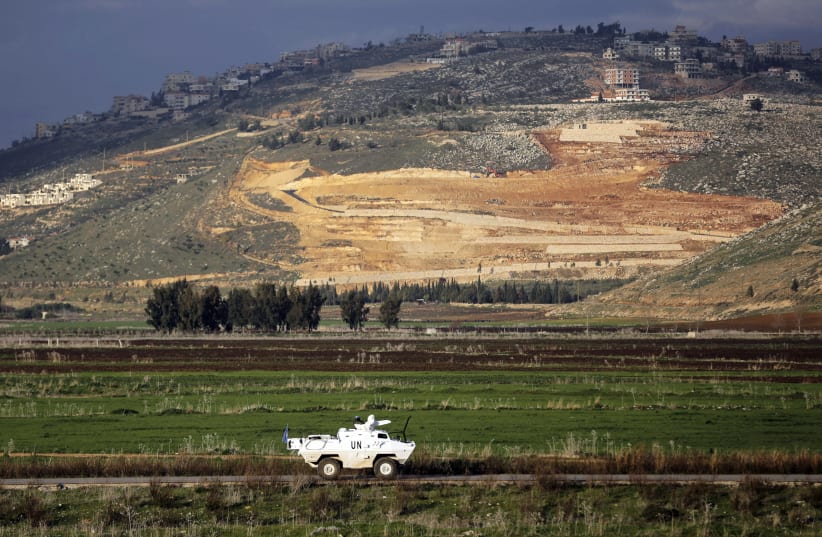At the meeting, the three Lebanese leaders agreed to “continue to move at various regional and international levels to prevent Israel from building the wall within the Lebanese border and the possibility of its encroachment on oil and gas wealth in Lebanese territorial waters,” the statement said.The three men will present a series of measures to Lebanon’s Higher Defense Council and security officials at a meeting on Wednesday, the statement added.In a regular tripartite meeting of military officers from Israel and Lebanon chaired by UN peacekeepers on Monday, Lebanon said that the wall passes through territory that belongs to it but which is located on the Israeli side of the UN-demarcated Blue Line, laid out after Israel’s withdrawal from southern Lebanon in 2000.“The Lebanese side reviewed the matter of the wall which the Israeli enemy intends to build... confirming the position of the Lebanese government rejecting the construction of this wall as it violates Lebanese sovereignty,” the Lebanese Army said in a statement after Monday’s meeting.In a statement, the UN Interim Force in Lebanon said the meeting had garnered great attention “due to engineering works south of the Blue Line previously announced by the Israeli side.”Maj.-Gen. Michael Beary, an Irishman who is the UNIFIL’s head of mission and force commander, noted that while there had been a “period of relative calm” since the last tripartite meeting, he urged both sides to restrain themselves, as “no one wants to return to a period of escalating tensions and a breach of the cessation of hostilities.”Israel’s security cabinet went to the Mount Avital lookout point on the Golan Heights on Tuesday and received a briefing from IDF Chief of Staff Lt.-Gen. Gadi Eisenkot, OC Northern Command Maj.-Gen. Yoel Strick and other senior officers.Following the briefings, Prime Minister Benjamin Netanyahu said that while Israel wants peace, it is “prepared for any scenario – and I suggest that no one test us.”He said he was impressed by the work the IDF was doing to defend the country’s borders.Tours of the security cabinet are not rare, and periodically the ministers are taken to the North, as well as to the border with the Gaza Strip, to get a close-up look and on-site briefings from top security officials. Mount Avital is near the border with the Syrian-held part of the Golan and the abandoned Syrian city of Quneitra.AOUN, HARIRI AND BERRI met with Beary in late January and accused Jerusalem of undermining peace with its construction, stressing that it “isn’t compatible with the efforts that [UNIFIL] is exerting in cooperation with the Lebanese Army to preserve security and stability along the southern border.”The construction of the wall was also criticized by Hezbollah Secretary-General Hassan Nasrallah, who warned Israel against the continuing construction.Israel and Hezbollah fought a 33-day war in 2006, which came to an end under UN Security Council Resolution 1701, which called for the disarmament of Hezbollah, for withdrawal of the IDF from Lebanon, and for the deployment of the Lebanese Army and for an enlarged UN force in the south.Disagreement over the wall and Lebanon’s plans to explore for oil and gas in disputed maritime waters have elevated tensions between Israel and Lebanon.The two countries have an unresolved maritime border dispute over a triangular area of sea of around 860 square kilometers that extends along several blocs designated for exploratory offshore drilling that Lebanon put up for tender last year.“The bloc lies entirely within Lebanon’s territorial and economic waters,” the Lebanese Army statement said.In a recent interview with The Jerusalem Post, retired R.-Adm. Prof. Shaul Chorev warned that this unsettled dispute could lead to an escalation with Lebanon.“Israel is ignoring Lebanon’s claim to these waters,” he said, adding that from what he understood the United States is implicitly supporting Lebanon’s claims over those of Israel.A commander in the Lebanese Army also stated on Monday that three Israeli warships recently violated Lebanese territorial waters near Ras el-Nakoura, not far from Israel’s Rosh Hanikra, on several occasions.On Monday, Aoun slammed recent remarks by Defense Minister Avigdor Liberman that the entire disputed maritime area is Israel’s, claiming that Liberman’s words represent Israel’s true intentions.Israel is highly dependent on the sea and a senior naval officer warned on Monday that Hezbollah has long-range missiles, including precision ballistic missiles received from Iran, which can hit the rigs and ships inside Israel’s Exclusive Economic Zone.“We believe that Hezbollah has the ability to strike any spot in our waters,” he said.Lebanon also accused Israel of violating its airspace on Monday over Mount Dov (Shaba Farms), at the intersection of the Golan Heights and the Lebanese-Syrian border, Jordan’s Petra news agency quoted a Lebanese security source as saying.According to the source, Israel carried out reconnaissance missions at medium altitude over the Lebanese villages of Arkub, Marjayoun and Hasbaya all the way to the eastern Bekaa Valley.Herb Keinon and Reuters contributed to this report.
Lebanon tells Israel its border wall violates sovereignty
In the meeting, the Lebanese side also rejected recent Israeli comments about Lebanon's offshore energy exploration.
